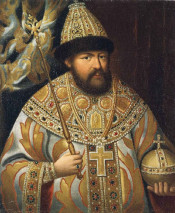
Russian throne during the reign of Tsar Alexei Mikhailovich - in the Presidential Library collections
March 29, 2018 marks the 389th anniversary of the birth of Tsar Alexei Mikhailovich (1629-1676) - the second sovereign of the Romanov dynasty, who ascended the Russian throne; the father of the first emperor of Russia Peter the Great. The Presidential Library portal features electronic collection "The House of Romanov. Zemsky Sobor of 1613", one of its sections is dedicated to Alexei Mikhailovich. The selection includes rare books and documents revealing the personality traits and the character of the government of this autocrat.
"Being among the spoiled Moscow society such a cultural leader as Peter the Great was - the cultural breakthrough in Muscovite Russia could have been designated earlier than it actually happened", - writes S. Platonov in the edition “Tsar Alexei Mikhailovich” (1913), an electronic a copy of which is available on the portal of the Presidential Library. - But there was no such a leader. On the contrary, the head of the Moscow state was then a curious and pleasant, but more noble, than a practically useful ruler. <...> Contemporaries sincerely loved Alexei Mikhailovich. The very appearance of the tsar spoke in his favor and attracted to him. A rare kindness shone in his living blue eyes".
According to I. Kataev in his book "Tsar Alexei Mikhailovich and his time" (1901), this kindness was active: "Charity towards fellows was the distinctive feature of the tsar: it was directed at people who were destitute and miserable. Almost every day in the royal court there was a generous donation from the tsar, on the feast they were invited to "stern" - that is, dinners".
Education under the supervision of "uncles" - Boyar Boris Morozov - left a mark on the impressionable youth. At the age of twelve, Tsarevich had his own children's library, among the books - a lexicon (a sort of encyclopedic dictionary), grammar, and cosmography. Along with curiosity, Alexei was distinguished by rare orthodox piety: strictly observed fasts and attended church services.
Alexei Mikhailovich entered the throne in 1645. During the first years of his reign, the state was actually run by the same boyar B. I. Morozov. The main concern of the new government was the replenishment of the state treasury. With this purpose in 1646 the royal decree increased the fee for salt, the population stopped buying it, and the revenues of the treasury fell. The salt tax was abolished, but simultaneously with the paying population began to collect arrears of taxes for the two previous years. In 1648, the mass discontent of the people of Posad in Moscow led to the Salt riot. It was obvious that in the country it was necessary to carry out wide transformations.
In 1649, the Zemsky Sobor adopted a new set of laws - "The Code of the Tsar and the Grand Duke Alexei Mikhailovich" which remained the basic law of the Russian state until 1830. The new set of laws contained norms not only procedural, but also state, civil, administrative and criminal law. The Code severely restricted the rights of the clergy, which, with the exception of the patriarch and his servants, was now subject to trial on general grounds and could not acquire estates. To administer the former patrimony of monasteries and clergy, a Monastic Order was established. This innovation was the occasion for the first disagreements between the monarch Alexei Mikhailovich and Nikon, who in 1652 was elevated to the throne of the patriarchs of Moscow and All-Russia. The young tsar revered the patriarch, listened to his advice, but over time their relationship went wrong.
"There is no doubt", - wrote A. Weidemeyer in his essay "On Russia under the Power of the House of the Romanovs to the Unity of Peter the Great" (1858), that by humility and meekness Nikon could regain the mercy of the sovereign, indulgent and kind-hearted, but so much before him; but Nikon, on the contrary, did not resign himself to the spirit, acted arrogantly and solemnly cursed his enemies. The meaning and influence of it on the people was strong. The tsar ordered to build a cathedral, which set forth Nikon's actions demanding that he be removed from the patriarchate".
Nevertheless, "Tsar Alexei Mikhailovich did not have what Peter the Great in the highest degree differed from", - writes I. Kataev in the book mentioned above, "there was no firmness or independence of character. He easily obeyed the influence of other people <...>, gave a lot of power to people who did not deserve it".
From troubles of a different kind the sovereign rested on his favorite falconry and even led a kind of "notes of a hunter". In the publication "The Hunting Diary of Tsar Alexis Mikhailovich 1657", an electronic copy of which is available on the portal of the Presidential Library, we read: "April 25, Saturday, after an early meal, went on a campaign to Tver fields to enjoy, and came at the last hour of the day. It was cloudy on that day, and from the fourth hour to the evening it was raining".
Not being a fighter in his character and reformer to the extent that his son Peter the Great soon appeared before the Russian people, Alexei Mikhailovich, however, strove to restore order in the state. And this was largely due to the above-mentioned Code. During the reign of Tsar Alexei, the colonization movement to Siberia continued, glorifying Khabarov and other Cossacks. The cities of Nerchinsk and Irkutsk were founded. A major achievement of Russian diplomacy during the reign of Alexei Mikhailovich was the reunification of Ukraine with Russia.
The collection of the Romanov dynasty includes about 900 items of storage. Official documents, memoirs, diaries, business and personal correspondence, fragments of newsreels, photographs and paintings, audio recordings of radio programs, popular science films, historical studies, bibliography and much more are among them.

